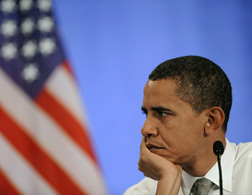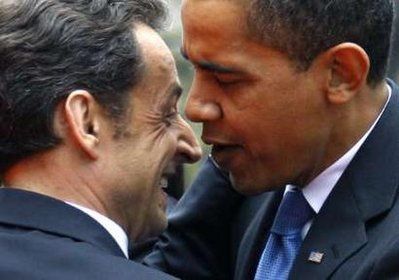
Obama's New Policy: To Please the Middle East
(China) on 5 June 2009
by 陈永杰 (link to original)
Before he was elected, Obama continuously emphasized the need for a peaceful coexistence between Israel and Palestine. Now, the negotiation process has become a cornerstone of his foreign policy rhetoric. Despite the constant talk of peace in the Middle East however, there has been little substantial work on related issues during the past few months. This lack of concrete action has thrown Obama’s speech in Cairo this week into the spotlight.
According to the White House Press Secretary, the speech is to be the President’s personal promise to the Muslim world, a promise based on mutual interest and mutual respect. The eloquent Mr. Obama is setting a new tone in Washington and dispensing with vague rhetoric regarding the Arab world. His statement will be clear-cut and purposeful, his speech to set the pace for U.S. foreign policy during his administration.
The final leg of President Obama’s journey will also include the commemoration of the D-Day landing at Normandy beach. His has visited two Middle Eastern countries before this trip, Saudi Arabia and Egypt; the U.S relies heavily on these two Arab allies. Saudi Arabia is one of the primary oil-producing countries worldwide and the richest country among Arab countries. On the other hand, Egypt acts as the “elder brother”, wielding potent political influence among its neighbors in the region.
Notably, although Obama’s visit will focus on the conflict between Israel and Palestine, the U.S. President did not actually visit Israel, despite the deep friendship between the two nations. He chose instead to visit Saudi Arabia and Egypt and to give his speech in Cairo, rather than from the safe havens of an Israeli university. This type of political P.R. provides plentiful hints regarding Obama’s upcoming policy moves in the Middle East.
One of the most important objectives of the President’s trip is to please the Arabic people as a whole, lay down a foundation for his “soft power” and “smart diplomacy” and to begin salvaging and rebuilding the image of the United States in the Middle East. Every word of this speech can be understood as a deep political statement, but the general purpose is to portray an attitude of friendship with very few, if any, conditions. White House officials hope this will mark a shift from the Bush administration’s unilateral rhetoric and pro-Israel policies.
Of course, if we consider the impending military defeat the U.S. faces in Iraq and Afghanistan, the desire for a change in focus is easier to understand. Since Obama came into power, he has hoped to withdraw U.S. troops from Iraq and redeploy forces to Afghanistan and Palestine. Now Obama is in a dilemma. Since the withdrawal was announced, violent conflicts have been on the rise in Iraq. While the Palestinian government has had some military victories against al-Qaeda recently, 70% of Afghanistan has fallen into the hands of the Taliban. Obama is facing an embarrassing situation should he be unable to withdraw troops from Iraq and, subsequently, to win in Afghanistan. Under these circumstances, he has not choice but to pander to Arab nations and Muslim people across the globe.
President Obama has gone to the Middle East to seek reconciliation and help from the Arab world while nations sit on the edge of their seats, waiting to hear what the President has to say about his primary focus: Israel and Palestine. The question remains: will Obama’s Cairo speech ‘betray’ Israel or will he opt to, like so many before him, ‘protect’ Israel at all costs?
In all reality, Obama is relatively open about the stark differences between the Israeli administration and his own as well as the tumultuous relationship between the new President and Israel’s newest prime minister Netanyahu. Obama looks to force Israel to accept a “two-state plan”, but Israel continues to extend Jewish settlement; additionaly the two men come yet to come to a consensus regarding Obama’s Cairo speech.
More crucially, Israeli concerns about the nuclear proliferation problem have led to gaping policy differences. The U.S. President has stated, “the United States won’t be at war with Islam” and while this seems a harmless and fair statement to make, the implications for Israel could be catastrophic- complete abandonment by the U.S. It would be a diplomatic and political catastrophe if Israel were to strike out on its own, “without authorization”, and attack Iranian nuclear facilities. Frighteningly, this is not too difficult of a situation to imagine.
Obama will have to put up yet another elaborate P.R. show while White House officials work to reconcile the abounding expectations of the Muslim world with the unprecedented complexity of the situation in the Middle East.

